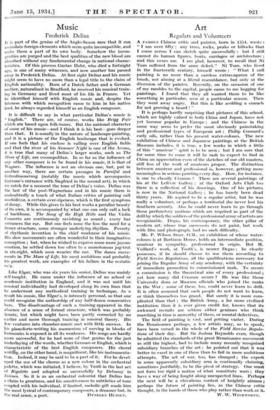Music Frederick Delius
IT is part of the genius of the Anglo-Saxon race that it can assimilate foreign elements which seem quite incompatible, and make them a part of its own body. Somehow the incon- gruities are purged and the best qualities of the new blood are absorbed without any fundamental change in national charac- teristics. Of this process Gustav Hoist, who died a fortnight ago, is one of many witnesses, and now another has passed away in Frederick Delius. At first sight Delius and his music might seem to have no more than a legal title to the claim of English nationality. Born of a Dutch father and a German mother, naturalized in Bradford, he received his musical train- ing in Germany and lived most of his life in France. Yet he identified himself with English music and, despite the lateness with which recognition came to him in his native land, he always regarded himself as an English composer.
It is difficult to say in what particular Delius's music is " English." There are, of course, works like Brigg Fair which are based upon folk-tunes. But the national character of some of his music—and I think it is his best—goes deeper than that. It is usually in the nature of landscape-painting, and it is a picture of the English landscape that is evoked. If one feels that his cuckoo is calling over English fields and that the river of his Summer Night is one of the Avons, it is true that many of Delius's larger works, such as The Mass of Life, are cosmopolitan. In so far as the influence of any other composer is to be found in his music, it is that of Wagner. The influence is not an obvious one, but, put in another way, there are certain passages in Parsifal and Giitterdammerung (notably the music which accompanies Gutrune's entrance with Siegfried in the second act), in which we catch for a moment the tone of Delius's voice. Delius was the last of the post-Wagnerians and in his music there is undoubtedly a touch of what Italian critics of painting call morbidezza, a certain over-ripeness, which is the first symptom of decay. While this gives to his best works a peculiar beauty of its own, it is accompanied by what one can only call a lack of backbone. The Song of the High Hills and the Violin Concerto are continuously ravishing as sound ; every bar entrances the ear. But one feels none the less the need for a firmer structure, some stronger underlying rhythm. Poverty of rhythmic invention is the chief weakness of his music. His slow movements are often wonderful in their imaginative conception ; but, when he wished to express some more joyous emotion, he settled down too often to a monotonous jog-trot in six-eight, which soon wearies the ear. The dance move- ments in The Mass of Life, his most ambitious and probably his greatest work, are examples of his failure in the ecstatic yen.
Like Elgar, who was six years his senior, Delius was mainly self-taught. He came under the influence of no school or academic institution in England, and it was not until his musical individuality had developed along its own lines that he underwent any methodical training in technique. As a result his music, like Elgar's, is intensely personal, so that one could recognize the authorship of any half-dozen consecutive bars.. The disadvantage of such a training appeared in the absence of a sense of formal structure, which was probably innate, but which might have been partly corrected by an earlier and more thorough training in musical theory. His few ventures into chamber-music met with little success. In his pianoforte-writing his mannerism of moving in blocks of harmonies is exposed in all its weakness. His songs are hardly more successful, for he had none of that genius for the just underlaying of the words, whether German or English, which is characteristic of the best English composers. His choral writMg, on the other hand, is magnificent, like his instrumenta- tion. Indeed, it may be said to be a part of it. For he devel- oped the use of the chorus as a new colour in the orchestral palette, which was initiated, I believe, by Verdi in the last act of Rigoletto and adopted so successfully by Debussy in Sirenes. So it is as an orchestral colourist that Delius has a claim to greatness, and his sensitiveness to subtleties of tone coupled with his individual, if limited, melodic gift made him the most lyrical of contemporary composers, a dreamer but, in
















































 Previous page
Previous page